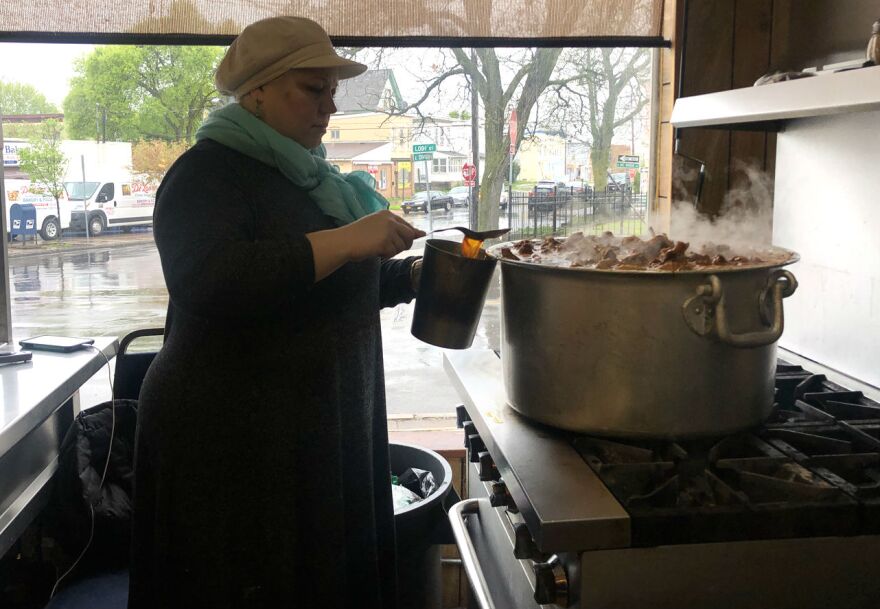Aromas of curry, cumin, turmeric, onions and other spices fill the room as goat curry cooks in a huge pot on the stove. Meanwhile, various dishes from cuisines around the world are served to customers. “It’s a blessing to feed people who were fasting the whole day; it’s a really beautiful benefit from God,” says Tatyana Mahmud.
It's the month of Ramadan, and she is working on a significant order. Goat curry is one of the many special dishes she prepares for the 400 Muslims who will break the fast together at Mosque Isa Ibn Maryam, in the Northside of Syracuse.
“This is the month of Ramadan right now; it’s a holy month for us,” Tatyana said, in Pyramids Halal Meat.
Behind her, a banner reads “Ramadan Kareem,” which means Happy Ramadan.
First Days in America is a set of non-narrated audio and digital stories that highlight the experiences of immigrants in a changing America. This project was produced at Syracuse University in May 2019. All stories were produced as part of Next Generation Radio, a week-long digital journalism training project designed to teach those interested in radio and journalism the skills and opportunity to report and produce their own multimedia story. Those chosen for the project were paired with a professional journalist as their mentor, to create a non-narrated audio and digital story that highlights the experiences of immigrants in a changing America.
Tatyana and her husband, Hani Mahmud, own Pyramids Halal Meat, a grocery store that has halal food, a unique option in Syracuse. (Find Map of store location here)
In 2011, this Muslim couple saw both a necessity and an opportunity to provide halal meat options to the community. The number of Muslim community members started growing in the Northside with the arrival of refugees. More than ten thousand refugees have been resettled here in the past 10 years. Hailing from Africa and the middle east, the northside of Syracuse provides a sense of community.
Halal is the Arabic word for permissible, meaning meat and food that meets Islamic standards.
"For the meat to become Halal," Tatyana said, "the animals need to be slaughtered in the name of God, and their entire blood must drain out completely."
“We have the halal food to support the community,” Hani said. “They can’t buy from outside because it’s not halal.”

Hani and Tatyana are both fasting. They don’t eat and drink from approximately two hours before sunrise until sunset, yet they both come to the store for work. Hani prepares halal-slaughtered meat for purchase.
Tatyana keeps up with her regular work schedule and cooks 18 dishes per day. But during Ramadan, it’s a bit challenging, she said.
“When you are fasting, you have no water, and your energy finishes very quickly,” she said. “But today God gives me power.”
The couple claims its business is booming now. However, the owners say that was not always the case, and starting a business in the Northside was not easy for them.
“People consider it a dangerous area,” Tatyana said. “They say [there's] a lot of crime here.”
Moreover, the immigrants add they faced some instances of racial intolerance because of their background when they initially settled in the city.
“It was tough being a person from another country,” Hani expressed. “There [were] a lot of race issues; it was really tough to experience that. People used to call on us - neighbors, health department, local police.”

For more than a decade, the Northside of Syracuse has been central for refugee resettlement, adding to the immigrant population. Hani explained, since the Northside side is a diverse area, his family also wanted to stay within a community that would not discriminate based on the family’s ethnic background.
Nowadays it’s not unusual to see children from different countries playing on the streets and families who shop in local stores that have ties to the countries they came from.
Syracuse has become home for refugees mostly from Burma/Myanmar, Somalia, Bhutan, the Democratic Republic of Congo and other African and Middle Eastern Countries
However, according to the Migration Policy, after the Trump administration imposed the travel ban in 2017, the number of refugees coming to the United States drastically decreased.
Syracuse was among the top ten regions that settled most refugees from Somalia. According to a recent report, in 2018, none of the Somalians made it to the United States.
Hani claims that the refugee population has a positive impact on the local economy.
"Now most of the refugees are independent since they have jobs. If it weren’t for the refugees, the city would always be down,” Hani said. “I don’t care if anybody [says] otherwise.”
The couple states they want to serve their community not only by providing food but also by offering jobs for refugees, who make up the majority of the staff. Tatyana says she is not only happy with the refugees’ job performance but also with their demeanor.
“They are good people,” she said, looking at Fatuma Djumbe, who has worked in the store for four years. “Their heart is what makes you happy. We are not just workers; we are like a family.”
Hani says, although people call him a community leader, he doesn’t want to be recognized for his efforts because he is only doing it for the sake of service. He adds that his community represents diversity and tolerance.
“It’s very interesting here,” Hani said. "I think the northside can show the entire city how you can be together because all live here together no matter what you are, what color you are [or] where are you from.”




